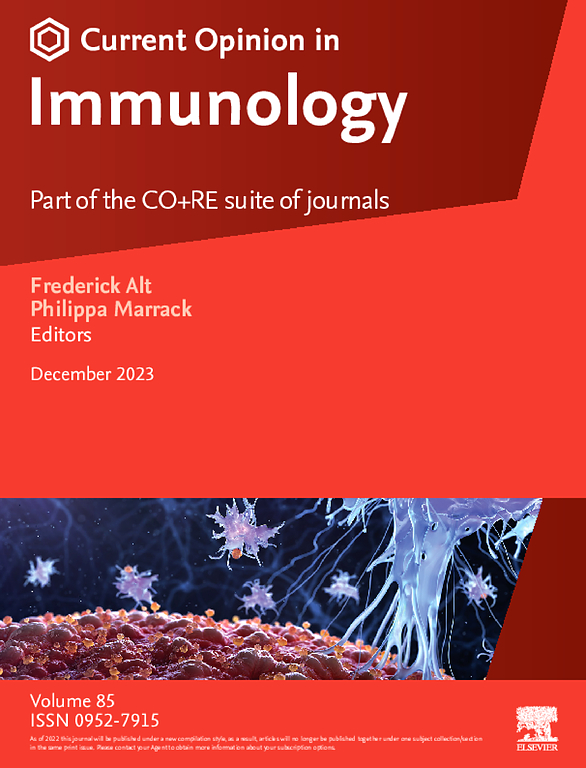更多的X,更多的问题:来自X染色体的贡献如何增强女性自身免疫的易感性
IF 5.8
2区 医学
Q1 IMMUNOLOGY
引用次数: 0
摘要
许多自身免疫性疾病表现出强烈的女性偏见。虽然性激素可能影响疾病中的性别偏见,但最近的研究表明,X染色体本身直接导致女性对自身免疫的偏见。具有两条X染色体的雌性利用X染色体失活(XCI)来沉默一条X染色体上的基因表达,使两性之间的表达平衡。X染色体高度富含免疫相关基因,最近的研究表明,女性系统性红斑狼疮患者淋巴细胞中XCI维持的保原性受到损害,这表明异常的X相关基因表达有助于自身免疫表型。XCI是由长链非编码RNA XIST/ XIST通过与失活X染色体和多种相互作用蛋白的相互作用启动和维持的,最近的研究也表明XIST/ XIST RNA驱动内体toll样受体信号传导,XIST/ XIST RNA-蛋白复合物作为自身抗原来源分别驱动自身免疫。在这里,我们将回顾这三种不同的途径,强调x连锁遗传学对理解自身免疫性疾病中女性偏见起源的重要性。本文章由计算机程序翻译,如有差异,请以英文原文为准。
More X’s, more problems: how contributions from the X chromosomes enhance female predisposition for autoimmunity
Many autoimmune diseases exhibit a strong female bias. While sex hormones may influence sex bias in disease, recent studies suggest that the X chromosome itself directly contributes to female-biased susceptibility to autoimmunity. Females with two X chromosomes utilize X Chromosome Inactivation (XCI) to silence gene expression from one X chromosome, equalizing expression between the sexes. The X chromosome is highly enriched with immune-related genes, and recent work indicates that the fidelity of XCI maintenance in lymphocytes from female systemic lupus erythematosus patients is compromised, suggesting that aberrant X-linked gene expression contributes to autoimmune phenotypes. XCI is initiated and maintained by the long noncoding RNA XIST/Xist through its interactions with the inactive X chromosome and numerous interacting proteins, and recent studies also implicate XIST/Xist RNA in driving endosomal Toll-like receptor signaling and XIST/Xist RNA-protein complexes in serving as a source of autoantigens to respectively drive autoimmunity. Here, we will review these three distinct pathways that underscore the significance of X-linked genetics for understanding the origins of the female bias in autoimmune disease.
求助全文
通过发布文献求助,成功后即可免费获取论文全文。
去求助
来源期刊
CiteScore
13.30
自引率
1.40%
发文量
94
审稿时长
67 days
期刊介绍:
Current Opinion in Immunology aims to stimulate scientifically grounded, interdisciplinary, multi-scale debate and exchange of ideas. It contains polished, concise and timely reviews and opinions, with particular emphasis on those articles published in the past two years. In addition to describing recent trends, the authors are encouraged to give their subjective opinion of the topics discussed.
In Current Opinion in Immunology we help the reader by providing in a systematic manner: 1. The views of experts on current advances in their field in a clear and readable form. 2. Evaluations of the most interesting papers, annotated by experts, from the great wealth of original publications.
Current Opinion in Immunology will serve as an invaluable source of information for researchers, lecturers, teachers, professionals, policy makers and students.
Current Opinion in Immunology builds on Elsevier''s reputation for excellence in scientific publishing and long-standing commitment to communicating reproducible biomedical research targeted at improving human health. It is a companion to the new Gold Open Access journal Current Research in Immunology and is part of the Current Opinion and Research(CO+RE) suite of journals. All CO+RE journals leverage the Current Opinion legacy-of editorial excellence, high-impact, and global reach-to ensure they are a widely read resource that is integral to scientists'' workflow.

 求助内容:
求助内容: 应助结果提醒方式:
应助结果提醒方式:


